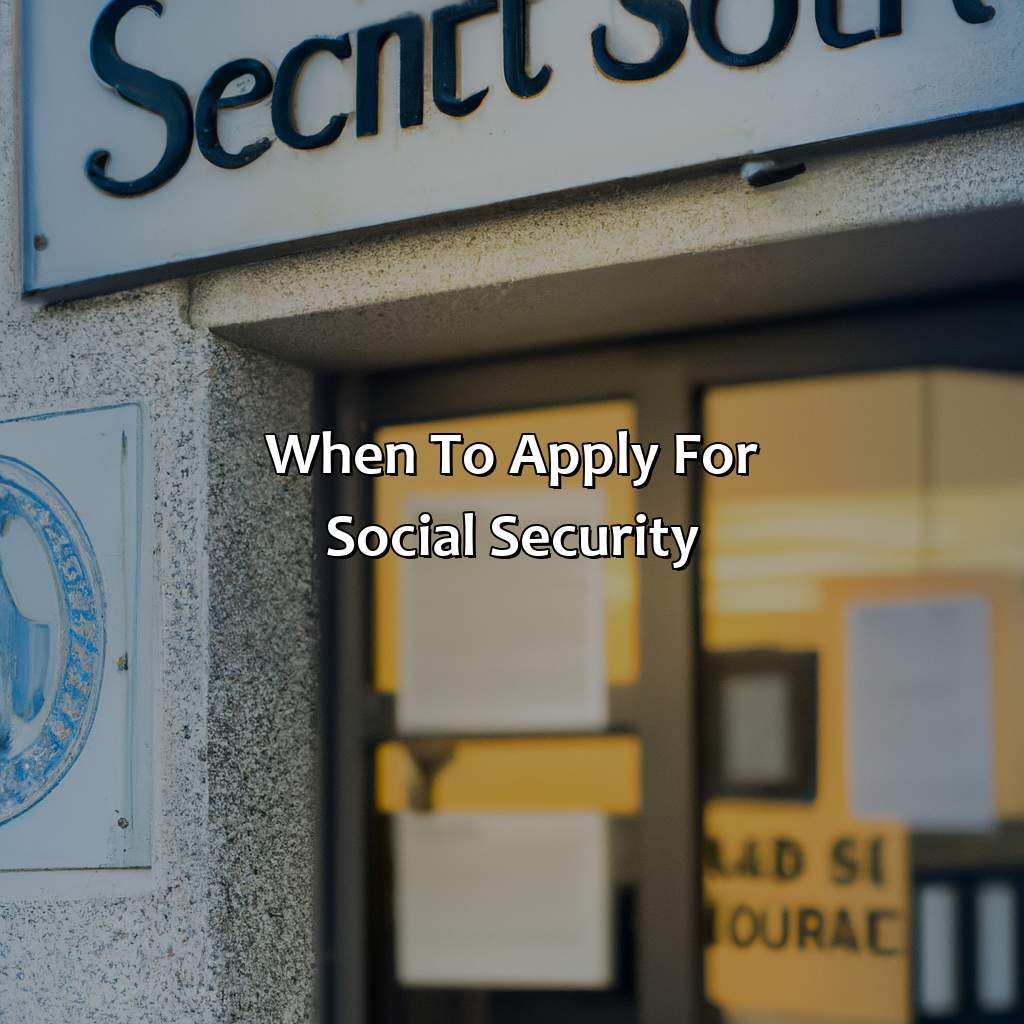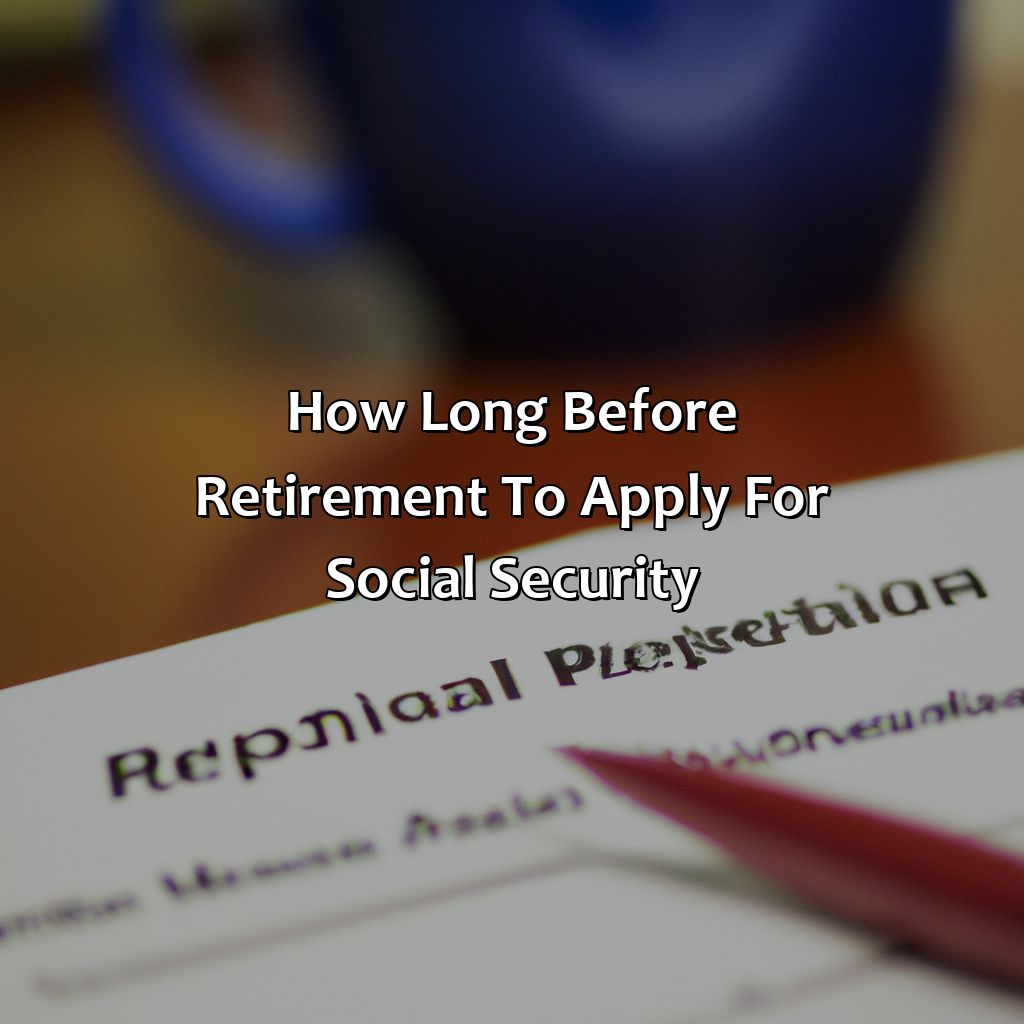How Long Before Retirement To Apply For Social Security?
Key Takeaways:
- Factors to consider before applying for social security include your financial needs, health, life expectancy, and sources of retirement income.
- Full retirement age, based on your birth year, affects the amount of social security benefits you receive.
- Early retirement benefits, available at age 62, provide a reduced monthly benefit, while delaying retirement may result in higher benefits.
- When applying for social security, gather necessary documents and be aware of spousal, survivor, and disability benefits that may be available.
- Timing is crucial in maximizing social security benefits, so carefully consider all factors before applying.
Are you uncertain about when to begin the process for Social Security benefits? You are not alone. This article will guide you through the steps to apply for Social Security before your retirement, so you can enjoy the benefits long before.
When to Apply for Social Security
Figuring out when to apply for social security can be tough. But, the Full Retirement Age is key in making this choice. It’s also worth looking into the pros & cons of early vs delayed retirement benefits.

Image credits: retiregenz.com by Adam Jones
Factors to Consider
When deciding on the optimal time to apply for Social Security, there are several factors that should be considered. Here are some of the most significant variables to assess.
| Factor | Description |
| Life expectancy | Determine how long you reasonably expect to live and whether delaying Social Security is a viable option. |
| Financial Need | Evaluate your budget and determine if you can afford to delay or whether you need the funds immediately. |
| Marital Status | If married, evaluate the potential spousal benefits that may impact your decision. |
It is essential to review all these factors when deciding when to apply for Social Security, considering other additional factors such as employment, health status, and overall retirement goals.
It’s crucial not to miss out on maximizing your Social Security benefits. By carefully evaluating these essential factors early on in the retirement planning process, retirees can optimize their strategy and ensure they aren’t missing out on potential payouts or varying circumstances calling for adjustments.
In summary, it is incredibly important not to rush into a decision about when to apply for Social Security. By examining all relevant variables with a clear head and long-term perspective in mind, becoming familiar with those necessary aspects like listed above can maximize financial well-being overall-life.
At least now I know I have something to look forward to in my old age: reaching full retirement age and finally being able to afford more than just ramen noodles and tap water.
Full Retirement Age
The age at which one can receive full Social Security retirement benefits varies based on the year of birth. This is determined by the Social Security Administration and known as the Primary Insurance Amount Age.
As of 2021, the full retirement age ranges from 66 to 67 years old, depending on the year of birth. Receiving benefits before this age may result in a reduction in monthly payments, while waiting until after may result in an increased benefit amount.
It’s important to note that individuals can still apply for Social Security as early as age 62, but this will result in a reduction of benefits. On the other hand, delaying past full retirement age could lead to an increased benefit amount.
In history, the full retirement age has gradually increased over time due to changes in legislation and policies regarding Social Security. Understanding when to apply and how it may impact monthly payments can greatly affect one’s retirement planning strategy.
Some people choose early retirement benefits for the freedom, while others choose delayed benefits for the extra income. I choose both because I can’t make up my mind.
Early vs. Delayed Retirement Benefits
Retirement Benefits – When to Apply
Applying for social security can be daunting, especially if you’re unsure when to begin receiving benefits. Here are five key points to consider when deciding between early vs. delayed retirement benefits:
- Early retirement at age 62 allows you to receive a reduced amount, typically around 30% less than the full benefit.
- Delayed retirement credits increase your benefit by 8% per year if you delay until age 70 and already have reached your full retirement age.
- You can start receiving retirement benefits as early as age 62 and as late as age 70.
- If you continue working past your full retirement age while receiving benefits, your payments may be reduced until you reach full retirement age again or stop working altogether.
- Your life expectancy is one of the most significant factors in deciding whether to take an early or delayed benefit.
A crucial detail to remember is that once you start receiving your Social Security benefit, it remains relatively constant throughout retirement. As such, it’s important to make a well-informed decision based on current needs.
It’s essential to seek professional advice from sources like ssa.gov on how you can maximize benefits while filling taxation gaps.
Fun fact: Did you know that approximately 96% of American workers are covered by Social Security?
Applying for Social Security is like playing a game of chess, except instead of pawns and kings, you have paperwork and bureaucracy.
Applying for Social Security
To get Social Security, you need to grasp the application process and gather the essential docs. Spousal, survivor, and disability benefits can be requested too. In the “Applying for Social Security” section, we’ll check out the sub-sections of the application process, what documents are necessary, and details regarding the special cases.

Image credits: retiregenz.com by Harry Woodhock
Application process
When to Apply for Social Security Benefits?
The right time to apply for Social Security benefits depends on your financial circumstances. The earlier you apply before retirement, the smaller amount you receive per month; therefore, the eligibility age is crucial. Here’s a four-step guide:
- Gather Documents- Birth Certificate, ID, Earnings Record
- Determine Eligibility and Amount- Use an online tool or Consult SSA
- Submit Application- Online or In-person
- Wait for Approval
Additionally, when applying for Social Security benefits do not forget to register yourself on the MySSA portal using your social security number and other personal details.
It’s also important to note that if you’re planning on working while collecting Social Security benefits, there will be an income threshold that you cannot exceed without reducing your benefits.
One example of a common misunderstanding involves those who aim to retire early but collect their Social Security too early as well may lower their overall payments in the long-term. A colleague of mine eagerly retired at 62 and began his application process soon after, only to realize that his monthly payment amount was significantly less than what he anticipated because he failed to wait until the eligible age of 67.
If you thought applying for a passport was bad, just wait until you see the laundry list of documents required for Social Security.
Required Documents
If you’re planning to apply for Social Security benefits, there are several documents required for the application process. These supporting items help to confirm your identity and eligibility, ensuring that you receive the financial assistance you deserve.
- A valid government-issued photo ID (such as a driver’s license or passport)
- Your Social Security card
- Birth certificate or other proof of age
- Marriage certificate if applying for spousal benefits
- Employment history and income records, including W-2 forms and self-employment tax returns for the past year
It’s important to note that additional documents may be needed based on individual situations, such as proof of military service or disability. Consult with an expert in social security services to ensure that all necessary documents are included in your application.
When gathering these essential documents, it’s also wise to prepare any questions you may have about the process and potential outcomes. With thorough preparation in mind, securing these required materials can put you one step closer toward a stress-free retirement.
In 1965, President Lyndon B. Johnson signed into law the creation of Medicare – which effectively established affordable health care coverage for those 65 years or older. In 2021 alone, over 70 million Americans were enrolled in Medicare coverage – demonstrating both its necessity, and its enduring legacy as a cornerstone of Social Security laws today.
The only thing better than having a partner for life is having a partner for Social Security benefits.
Special Cases: Spousal Benefits, survivor benefits, disability benefits
For social security, there are specific cases that people can apply for on top of their normal benefits. These circumstances include benefits for spouses, survivors and those who are disabled. Here is what you need to know about these special cases:
- Spousal Benefits – A spouse can claim a portion of their partner’s social security earnings once they reach the age of 62 or older, or if they care for a child under 16.
- Survivor Benefits – If your spouse passes away, you may be eligible to receive survivor benefits based on their social security earnings.
- Disability Benefits – For individuals with disabilities that prevent them from working for a year or more, it may be possible to receive disability benefits.
These options provide financial support beyond the typical retirement age. Be sure to discuss these possibilities with your financial advisor and/or the Social Security Administration.
It’s worth noting that each case has its own set of eligibility requirements and application procedures. It’s important to research thoroughly before applying.
One individual applied for spousal benefits but was initially rejected due to improper documentation. After gathering all necessary forms and submitting them again, they were able to successfully obtain the spousal benefit they were entitled to. Retirement may be a long way off, but applying for social security is like a game of chess – it’s all about strategy and timing.
Importance of Timing in Maximizing Social Security Benefits
Timing plays a key role in optimizing benefits from Social Security. Choosing when to apply can impact how much you receive. It’s crucial to find the sweet spot between early and late application. The timing and strategy of claiming your payments also depend on your unique financial situation, age, health, and work history.
By applying for Social Security at the right time, you can maximize your retirement income and overall financial security. Some factors that may influence your decisions include spousal benefits, taxes, inflation rates, and changes to the Social Security program.
However, it is not enough to apply randomly or based on convenience; planning ahead is necessary. A delay of just a few months could result in significantly higher monthly payments in Old Age. Therefore, strategizing early – ideally five years before retiring – could save hundreds of thousands of dollars over one’s lifetime.
Avoid the fear of missing out on significant increases in income by consulting with professionals or employing reliable calculators to address any confusion regarding Social Security applications. Time spent now can lead to long-term financial stability in retirement.
Five Facts About How Long Before Retirement To Apply For Social Security:
- ✅ Full retirement age for Social Security benefits is between 66 and 67, depending on your birth year. (Source: SSA.gov)
- ✅ It’s recommended to start planning for Social Security benefits at least five years before retirement. (Source: NPR)
- ✅ You can start receiving reduced Social Security benefits at age 62. (Source: SSA.gov)
- ✅ Delaying Social Security benefits past full retirement age can increase your monthly benefit amount. (Source: AARP)
- ✅ It’s important to consider factors like life expectancy and financial need when deciding when to apply for Social Security benefits. (Source: Kiplinger)
FAQs about How Long Before Retirement To Apply For Social Security?
How long before retirement should I apply for social security?
The earliest you can apply for social security retirement benefits is at age 62, but many people choose to wait until they reach full retirement age (which is currently between 66 and 67 depending on your birth year) to maximize their benefits.
Can I apply for social security before I retire?
Yes, you can apply for social security retirement benefits as early as age 62, regardless of whether you are still working or not.
If I apply for social security early, will my benefits be reduced?
Yes, if you apply for social security retirement benefits before your full retirement age, your monthly benefit amount will be reduced. The reduction amount varies depending on how early you apply.
What happens if I delay applying for social security after my full retirement age?
If you delay applying for social security retirement benefits beyond your full retirement age, your monthly benefit amount will increase by a certain percentage for every month you delay until age 70.
When is the best time to apply for social security retirement benefits?
The best time to apply for social security retirement benefits depends on your individual circumstances and financial needs. It may be beneficial to wait to apply until your full retirement age or beyond to maximize your monthly benefit amount, but you should also consider your current financial situation and whether you need the additional income to support your retirement expenses.
How do I apply for social security retirement benefits?
You can apply for social security retirement benefits online, by phone, or in-person at your local Social Security Administration office. To apply, you will need to provide personal information and documentation such as your birth certificate, Social Security number, and work history.





